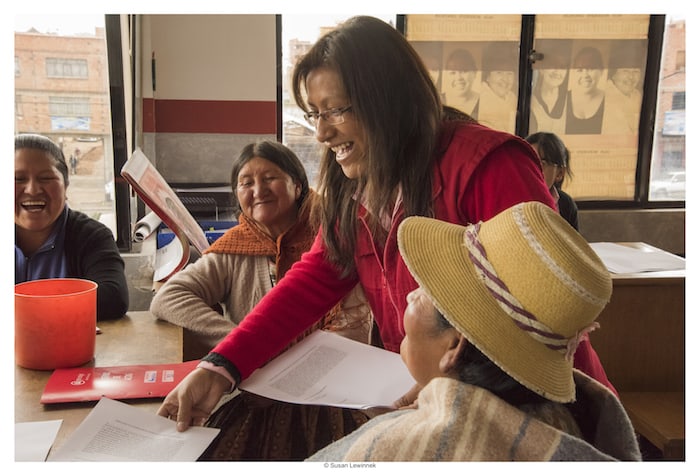Boosting Gender Equality Through Entrepreneurship: A Q&A with Pro Mujer CEO Maria Cavalcanti
A shift has taken hold among women entrepreneurs in Latin America in recent years. A significant majority of women are starting businesses out of opportunity rather than out of necessity. A 2014 study of eight LAAM countries and Jamaica backs up the claim; so does Maria Cavalcanti.
In early 2016, Cavalcanti was named president and CEO of Pro Mujer, and has ambitious plans to expand the nonprofit financing and health services organization. For more than 25 years, Cavalcanti has worked as an impact investor and business consultant in India, Latin America, the U.S. and Western Europe. Before joining Pro Mujer, she was the co-founder and managing partner of FIRST Impact Investing, a private equity fund in Brazil; and before that served as chief strategy officer for Fundación Avina (the Avina Foundation), where she oversaw operations in 15 countries. She has also served on the boards of the Aspen Network of Development Entrepreneurs, PYME Capital Latin American Fund and FUNDES.
Pro Mujer was founded by Lynne Patterson and Carmen Velasco in 1990 in Bolivia, and today works with entrepreneurs in that country as well as Argentina, Mexico, Nicaragua and Peru. In 2015, Pro Mujer reported providing $330 million in loans to more than 250,000 clients. Operating mainly in urban and peri-urban regions, Pro Mujer also provides direct and indirect health care services through a series of centers and mobile clinics. Services include non-communicable disease detection, but also dental care and ultrasound diagnostics.
I recently caught up with Cavalcanti to discuss Pro Mujer’s growth aspirations as well as the changing aspirations of women entrepreneurs across the region.
Scott Anderson: How would you describe Pro Mujer to someone who’s never heard of the organization?

Maria Cavalcanti
Maria Cavalcanti: Pro Mujer is an organization dedicated to empowering women in Latin America. We do this in an integrated way, offering a diversity of products and services to meet the needs of low-income women. We started out 27 years ago in Bolivia with microfinance, recognizing the creative potential of women to build businesses with the right opportunity.
Today, we represent one of the largest women’s development organizations in the Latin America region. We offer a suite of financial and health services, alongside capacity-building trainings to promote business skills and healthier living. As we look ahead, we are focused on amplifying our services and expanding our footprint. By leveraging partnerships and technology, we are building Pro Mujer as a platform capable of serving millions at a time; a one-stop shop for empowerment for women in the region.
SA: How does Pro Mujer integrate health care services and other capacity-building services with loans?
MC: Pro Mujer’s financial services are largely administered through communal banking, where women form solidarity groups and guarantee each other’s loans. These groups also serve as creative spaces where we offer preventive health education, trainings on business skills and financial literacy. The group methodology encourages leadership and helps us build trust with women and their communities.
Additionally, women can also access affordable, high-quality health care at clinics within Pro Mujer Service Centers, the same locations where they make loan payments.
SA: What are the benefits to this approach – both monetarily for the organization and for the entrepreneurs?
MC: Our communal banking methodology allows us to fully pursue our mission of empowering women, focusing on serving some of the poorest and most marginalized populations. Most of the women who join Pro Mujer come from the informal sector, lack credit history, savings, collateral or a guarantor, and have often been denied access to traditional forms of credit.
Additionally, our approach benefits our entrepreneurs and our organization by reducing risk. If one woman is unable to pay her loan during a payment cycle, her peers will cover for her. Pro Mujer has a repayment rate of 96 percent, a testament to our approach and expertise ensuring entrepreneurs access the right financial services for their needs.
SA: This month on NB we’re focusing on entrepreneurship. How does Pro Mujer evaluate whether entrepreneurs are going to be a good fit with the types of loans it issues?
MC: Pro Mujer employs a robust staff of loan officers who meet with women to determine their eligibility for our financial services. These loan officers are equipped with mobile technologies to gather and manage client data, as well as evaluate credit-worthiness. This ensures an optimal experience for the women we serve and allows us to protect women from taking more credit than they can handle.
Finally, assessing the fit of an entrepreneur with our financial services has as much to do with the type of business and experience the entrepreneur has in carrying out her business plan. We want to fully support our entrepreneurs, and help them succeed beyond financing. For example, we are collaborating with the Failure Institute to research the experiences of failed entrepreneurs and find ways this knowledge can help support our clients and make their chances of success higher.
SA: You have a good deal of experience working with entrepreneurs as an investor and mentor. Have you observed changes in the traits, qualities, aspirations of women entrepreneurs in Latin America compared with just a few years ago? I’m thinking here about business model sophistication, sector shifts, social aspects to enterprises, etc.
MC: A few years ago, women in Latin America were entrepreneurs out of necessity as they felt that it was their only means of income. Today, more women are becoming entrepreneurs not out of necessity, but rather because they see an opportunity. This falls in line with global trends that show that the number of women entrepreneurs globally increased 7 percent from 2013 to 2016 (the Global Entrepreneurship Monitor Report). From a regional perspective, Latin America and the Caribbean has the highest average female entrepreneurial rates (17 percent). However, despite these positive changes over the last few years, there is still a gender gap in entrepreneurship that leaves much room for improvement. At Pro Mujer, we are witnessing firsthand how women entrepreneurs in Latin America face barriers, primarily access to finance, networks and management tools. As such, it becomes absolutely critical to ensure women are receiving the necessary financial, mental and physical support to succeed.
SA: In a recent podcast interview, you mentioned the importance of not fighting exclusion with exclusion, the point I believe being that those concerned with the challenges women face need to be concerned with the whole family. Can you expand on that? Is fighting “exclusion with exclusion” an issue, given the increased gender lens focus for many lenders?
MC: Yes, it is critical to include men and families in the conversation on gender equality in order to advance. Men, in particular, can be role models, key allies and activists, and have a powerful role in shaping the future generation. A recent study from Promundo found that children who have an involved father early on have, on average, fewer behavior problems, less criminal activity, better performance in school and less stress during adulthood.
While we are seeing a recent increase in financial institutions adopting a gender focus, Pro Mujer has always seen the participation of partners and families as key to a transformation that goes beyond financial inclusion. For this reason, we also ensure our health services are offered to our clients’ partners and children.

SA: I understand you are trying to move Pro Mujer toward more of a social enterprise style versus nonprofit type of culture. What does this mean in terms of how the organization operates, internally and externally?
MC: In reality, Pro Mujer has already been functioning as a social enterprise in many ways, as we are a sustainable, mission-driven organization with for-profit operations in health and financial services while using philanthropic capital to cover those initiatives which are not yet financially viable. As part of our strategy moving forward, we are reorganizing and creating a structure that will provide more flexibility in funding options, minimize risks and promote strategic growth. As such, the term social enterprise better captures these changes toward greater efficiencies, scalability and the leveraging of diverse sources of capital.
SA: One of the new initiatives you’re pursuing as CEO is putting technology at the forefront of financing entrepreneurs. Why is it a core part of Pro Mujer’s strategy and can you provide an example?
MC: Absolutely! Technology is critical on a number of fronts. It is core to our approach in expanding our services and products to meet the ever-evolving needs of the women we serve.
Mobile loan processing and payment applications will improve operational efficiencies and offer our clients an easier and safer way to service their loans. Secondly, we are implementing a core banking system across all Pro Mujer countries to standardize key processes and modernize loan processing, customer tracking and financial accountability. This contributes to our goal of keeping Pro Mujer technologically at the forefront to ensure we are able to continuously grow and adapt to meet clients’ needs.
SA: What are your growth aspirations for Pro Mujer and what are the biggest challenges to reaching them?
MC: While we are proud to have impacted millions of women and their families and provided over 8 million health interventions, we also recognize that we are only scratching the surface of the 80 million vulnerable women in Latin America. Recognizing the sheer number of women in poverty in the region, and our potential to serve them is both our greatest challenge and our greatest drive.
We understand that the needs of our clients are not only great in number, but are also diverse and ever-changing. To meet this challenge, we rely on partners and allies. Through a network of best-in-class providers, fintech and tech companies, philanthropists and social impact investors, we can build our platform, our one-stop shop for empowerment, to meet these diverse needs. As I mentioned earlier, we cannot fight exclusion with exclusion. We welcome and entreat those committed to gender equality and Latin America to join us, join our movement.
Scott Anderson is a contributing editor at NextBillion.
Photos courtesy of Pro Mujer.
Homepage photo: Bioversity International via Flickr.
- Categories
- Health Care



